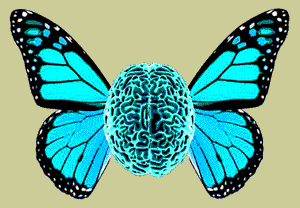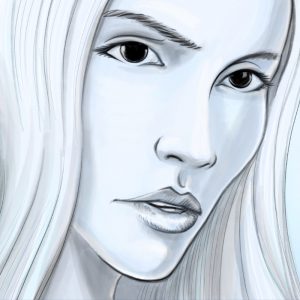Ada Hoffmann is a favorite author of mine, and one of the greatest talents in the emergent genre of neuroqueer speculative fiction. In April of 2021, Ada conducted an extraordinary series of interviews with autistic speculative fiction authors, which she published on Substack. I was honored to be one of the authors she chose to interview. This is Ada’s interview with me, reprinted in its entirety with her kind permission.

Tell me about a recent work you released – a short story, a poem, a book, a game. What one work of yours do you hope readers will go out and read today? What’s it about?
I’ll tell you about two recent works, because they’re closely connected and because I’m bad at following instructions.
First, I should mention that every work of fiction I write is a piece of an ever-growing mosaic of interconnected stories called the Weird Luck Saga, which is an ongoing collaboration between me and my old friend Andrew M. Reichart. Andrew and I have been co-writing this stuff since high school but didn’t start publishing any of our work until we were in our forties. The Weird Luck Saga includes pieces written by him, pieces written by me, and some pieces co-written by the two of us.
So, the first recent piece: Autonomous Press just released Spoon Knife 5: Liminal, which is the fifth volume of our annual multi-genre neuroqueer lit anthology. Andrew and I were co-editors of this volume, along with our friend and fellow author Dora M. Raymaker.
My story in Spoon Knife 5 is called “Something Nice.” It features a recurrent Weird Luck Saga character named Bianca, who’s one of my favorite characters to write. Bianca is a telepath who serves as a psychotherapist in a vast organization called the Reality Patrol, which polices the boundaries between alternate realities. The story is largely about trauma and memory: Reality Patrol agents frequently experience trauma in the line of duty, and Bianca is good at healing that trauma; at the same time, she has a dark history that includes inflicting a lot of trauma, and she herself suffers from severe post-traumatic stress disorder. She also has large gaps in her memory, and is unable to remember whether those gaps are a result of her trauma. In the story, she runs into a patient who wants to kill her over a past incident that she’s unable to remember.
 The second piece: we recently launched a Weird Luck webcomic, which is co-written by me and Andrew and drawn by the fantastically talented Mike Bennewitz. This one follows the adventures of a Reality Patrol agent stationed in a city where reality is so badly warped that it’s been classified as a “permanent interdimensional urban disaster zone.” Bianca is also going to play a major role in the comic, which takes place 12 years after her appearance in “Something Nice.” I figured I’d mention both “Something Nice” and the webcomic here in order to give a sense of the way that different pieces of the Weird Luck Saga can interconnect.
The second piece: we recently launched a Weird Luck webcomic, which is co-written by me and Andrew and drawn by the fantastically talented Mike Bennewitz. This one follows the adventures of a Reality Patrol agent stationed in a city where reality is so badly warped that it’s been classified as a “permanent interdimensional urban disaster zone.” Bianca is also going to play a major role in the comic, which takes place 12 years after her appearance in “Something Nice.” I figured I’d mention both “Something Nice” and the webcomic here in order to give a sense of the way that different pieces of the Weird Luck Saga can interconnect.
As for readers going forth to read these pieces today, of course I hope that everyone will check out Spoon Knife 5––both for my story and all the other excellent stories in that volume. Even better, though, readers can check out the Weird Luck webcomic right away, for free, at weirdluck.net. There aren’t many pages up there yet, but we post a new page every week and over time it’s going to grow into quite the epic tale.
When you were learning to write, did you have non-neurotypical authors to look up to?
Oh, most definitely. Back in the days of my distant youth, though, when my future writing was being shaped by my early formative influences, I wasn’t thinking of those influences as “non-neurotypical” because that terminology didn’t exist yet. Because I’m old. But I intuitively recognized certain authors as being members of my own nameless tribe, even if I didn’t yet have words for the precise nature of the kinship I was sensing.
Samuel R. Delany was a crucial one for me. I read Babel-17 when I was 12, and Dhalgren when I was 14. Also read everything else by him that I could find, but those two were the most important for me. Babel-17 didn’t influence me so much as a writer, but it did change my life because it was the reason I started practicing aikido: I identified with the heroine, and I’d been trying to decide whether to start learning a martial art and which martial art to learn, and at some point in the book it’s mentioned that the heroine is an aikido black belt. Dhalgren, though, definitely influenced my writing; it was my first experience of reading a book that conveyed the perceptions of a character whose experience of reality was anything like my own.
Hunter S. Thompson was another formative influence, in terms of writing style. Most people who love Thompson or hate him are attracted or repelled by his reckless drug-crazed outlaw persona––and I admit that did hold a certain appeal for me when I was a teenage stoner––but what people don’t talk about as much is how well-crafted his prose is. Once I noticed that, I learned a lot from it. Anyway, I’m convinced that Thompson was an undiagnosed autistic, and that all his alcoholism and drug abuse and aggressively reckless behavior were largely a coping strategy to enable him to survive social environments that would otherwise have overwhelmed him. First time I ever saw him interviewed on camera was the first time I ever saw another human being who moved their body and hands the same way I did.
Tell me about a special interest of yours. Have you found yourself incorporating your special interests into your fiction?
Oh, yes. How could I not? Isn’t that one of the most fun parts of writing?
I find that some interests show up in more subtle ways than others. The interest in psychoanalytic theory that contributed to my becoming a psychology professor shows up pretty overtly in my writing. We’ve got scenes of Bianca performing psychotherapy and unearthing secrets from her patients’ unconscious minds… and then there’s my short story “Waiting for the Zeppelins,” in the Spoon Knife 3 anthology, where the villain is a megalomaniacal alternate-reality version of Sigmund Freud.
My interest in old newspaper comic strips, on the other hand, shows up in the form of more obscure or subtle references. For instance, the heroine of the Weird Luck webcomic is Agent Sojac, named in honor of the nonsense phrase “notary sojac” that frequently appeared in the background of the mid-20th-century absurdist comic strip Smokey Stover.
What one thing do you wish more speculative fiction readers knew about autism?
Too often I see conversations on social media where an autistic person mentions that they resonate with some fictional character and recognize that character autistic, and they receive hostile and dismissive responses from non-autistic people who maintain that the character can’t be autistic because the author never explicitly labels the character as autistic.
But that’s not how life works. Most autistic people don’t walk around wearing big signs that say “autistic” on them, and don’t announce “Hi, I’m autistic” when they walk into a room. Most non-autistic people have interacted with an autistic person without recognizing they were autistic. Autistic people existed––and sometimes served as the inspiration for fictional characters––before the term “autism” was coined and before anyone thought of us as a particular nameable category of person.
I find that too many readers still operate from a set of implicit racist, heteronormative, and neuronormative cultural assumptions in which they assume that being white, cisgender, heterosexual, and neurotypical is the default “normal” way to be––and thus, by extension, assume that all the characters they read about are white, cisgender, heterosexual, and neurotypical unless the author explicitly states that the character is something other than white, cisgender, heterosexual, and neurotypical.
So I wish that more readers didn’t operate from these racist, heteronormative, and neuronormative assumptions, and that more readers were capable of recognizing that characters might be non-white, queer, and/or neurodivergent even when the author doesn’t cater to normative cultural assumptions and spoon-feed the reader by explicitly labeling and announcing the race, gender, sexuality, and/or neurotype of every character who isn’t white, cisgender, heterosexual, and neurotypical.
As far as I’m concerned, a character is autistic if the character resonates with the reader as being autistic. I’m perfectly comfortable with the idea that a character can be autistic regardless of whether the author who created them thinks of the character as autistic. I’m perfectly comfortable with the idea that each story is a different story for each individual reader, and that each reader’s subjective experience of a story is as valid as the author’s experience of the story, and that therefore a character can be autistic for some readers and not for others. People who are unable to tolerate that sort of ambiguity are tedious and aren’t the audience for whom I write.
And frankly, a reader who can’t easily recognize autism in characters like Susan Calvin (I, Robot), Entrapta (She-Ra and the Princesses of Power), Hoshi Archer (Hoshi and the Red City Circuit) or Holly Gibney (Mr. Mercedes and The Outsider) just needs to get to know more autistic people.
Do you have any writing advice for other autistic people?
Yes. Write fiction if you have some characters in your head that feel engaging and alive to you, and if you’ve made up an interesting story about some things those characters do. If you want to write an educational Autism 101 piece where you explain to non-autistic people what autism is, do everyone a favor and just write it as a nonfiction piece.
Attempts to squeeze a bunch of educational Autism 101 information into a fiction story inevitably come across as clunky and contrived, and detract from the quality of the story. Autism 101 pieces and kick-ass works of fiction with well-imagined autistic characters both play a valuable role in helping people to better understand autistic experience, but the two don’t mix gracefully.